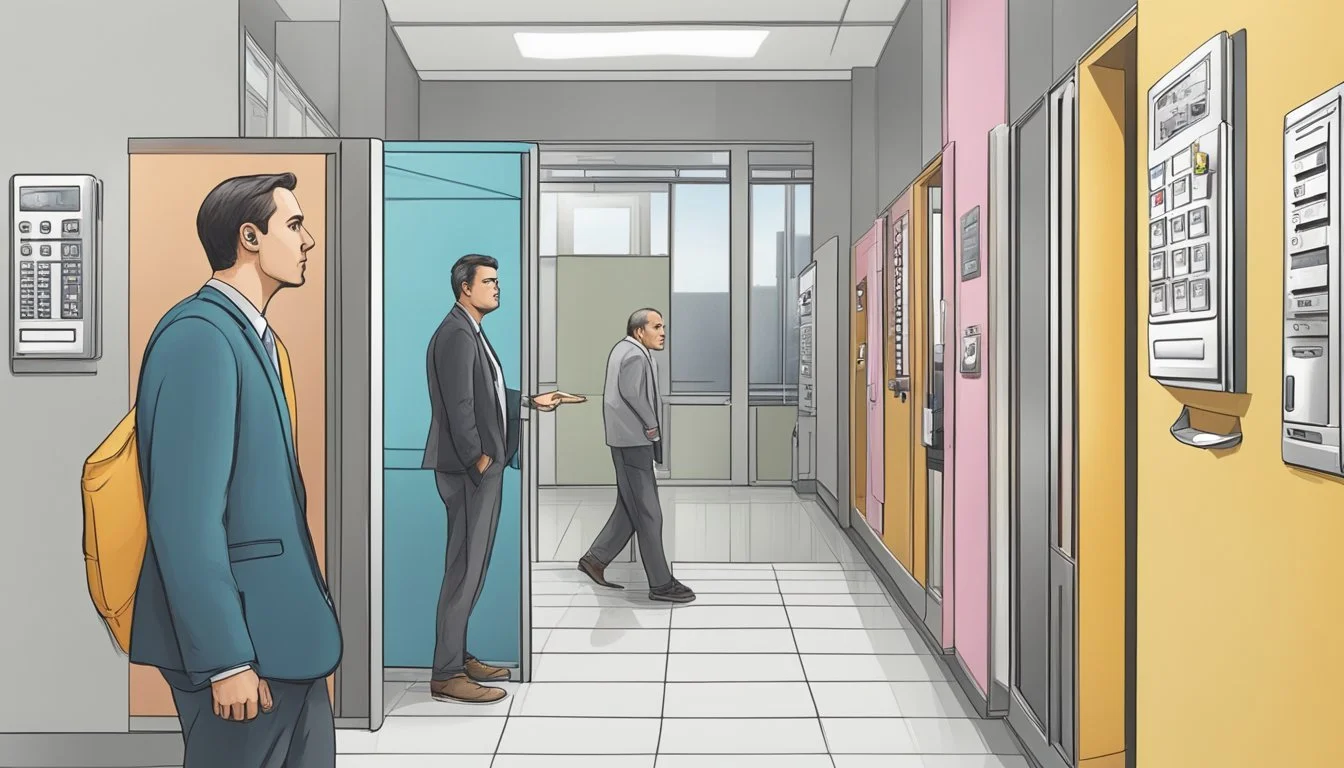Understanding the Progressive Phases of Narcissistic Collapse
Narcissistic collapse can be a tumultuous experience for individuals with narcissistic personality disorder. This phenomenon occurs when a narcissist's carefully constructed facade crumbles, exposing their underlying insecurities and vulnerabilities. The stages of narcissistic collapse typically include denial, anger, bargaining, depression, and acceptance, mirroring the well-known stages of grief.
Reddit users have shared their personal experiences with narcissistic collapse, providing valuable insights into this complex process. Many describe intense emotional turmoil, including suicidal thoughts, depersonalization, and self-harm. These accounts highlight the severe psychological distress that can accompany the breakdown of a narcissist's self-image.
Recognizing the signs of narcissistic collapse is crucial for those dealing with narcissists or experiencing it themselves. Common indicators include angry outbursts, increased irritability, aggressive behavior, and heightened sensitivity to perceived rejection. Some individuals may also exhibit defensive behaviors or sink into depression as they struggle to cope with their changing self-perception.
Understanding Narcissistic Personality Disorder
Narcissistic Personality Disorder (NPD) is a complex mental health condition characterized by an inflated sense of self-importance and a deep need for excessive attention and admiration. It significantly impacts how individuals perceive themselves and interact with others.
Defining NPD and Its Characteristics
NPD is a personality disorder marked by grandiosity, a constant need for admiration, and a lack of empathy. Individuals with NPD often display an exaggerated sense of self-importance and believe they are superior to others. They may fantasize about unlimited success, power, or beauty.
People with NPD require constant praise and attention. They often exploit others for personal gain and struggle to recognize or identify with the feelings and needs of others. This disorder can lead to difficulties in personal relationships, work, and other areas of life.
Diagnosis Criteria and Prevalence
Mental health professionals use specific criteria from the Diagnostic and Statistical Manual of Mental Disorders (DSM-5) to diagnose NPD. These criteria include:
Grandiose sense of self-importance
Preoccupation with fantasies of unlimited success, power, or beauty
Belief in one's own uniqueness and special status
Need for excessive admiration
Sense of entitlement
Interpersonal exploitation
Lack of empathy
Envy of others or belief that others are envious of them
Arrogant behaviors or attitudes
NPD affects an estimated 1% of the general population. It is more commonly diagnosed in men than women. The exact causes of NPD are not fully understood, but a combination of genetic, environmental, and developmental factors likely contribute to its development.
Triggers of Narcissistic Collapse
Narcissistic collapse can be precipitated by various events and circumstances that challenge a narcissist's inflated self-image. These triggers often stem from external sources but can also arise from internal conflicts and realizations.
Common Triggers and Stressors
Criticism and confrontation frequently spark narcissistic collapse. Even minor critiques may be perceived as severe threats to a narcissist's self-esteem. Financial setbacks can also trigger collapse, as wealth often forms a core part of their identity.
Public humiliation or exposure of flaws is particularly destabilizing. This might include being caught in a lie or having incompetence revealed. Aging and loss of physical attractiveness can be devastating triggers, as narcissists often stake their worth on appearance.
• Criticism or confrontation • Financial losses • Public humiliation • Exposure of flaws or lies • Aging and physical changes
Stress from work pressures or relationship conflicts may accumulate over time, gradually eroding the narcissist's facade until it crumbles.
The Role of Rejection and Failure
Rejection in personal or professional spheres can swiftly lead to narcissistic collapse. A romantic partner leaving or a job application being turned down may shatter the narcissist's sense of superiority. Failure to achieve important goals or meet high expectations often triggers intense distress.
Losing competitions or comparisons with others can be particularly damaging. This might include a rival receiving a promotion or accolades the narcissist felt entitled to. Academic or career failures that contradict the narcissist's belief in their exceptional abilities are common collapse triggers.
Social rejection, such as exclusion from desired groups or events, may prompt collapse by challenging the narcissist's perceived popularity and importance.
Impact of Abandonment and Denial
Abandonment by key sources of narcissistic supply can precipitate collapse. This might involve the loss of a spouse, close friend, or admiring colleague who previously bolstered the narcissist's ego. The sudden absence of praise and adoration can leave narcissists feeling empty and unstable.
Denial of special treatment or privileges often triggers collapse. Being forced to wait in line, follow rules, or be treated as ordinary can be deeply unsettling for narcissists accustomed to exemptions.
Confronting undeniable evidence that contradicts their grandiose self-image may lead to collapse. This could involve irrefutable proof of mediocre performance or average abilities in areas where the narcissist claimed excellence.
Manifestations of a Narcissistic Collapse
A narcissistic collapse involves profound shifts in behavior and emotional states as the individual's inflated self-image crumbles. These changes can range from intense outbursts to withdrawal and depression.
Signs and Symptoms to Recognize
Narcissistic collapse often begins with increased irritability and defensiveness. The individual may become hypersensitive to perceived criticism or slights.
Angry outbursts become more frequent and intense. These can involve yelling, throwing objects, or making threats.
Depression and anxiety may set in as the narcissist struggles to maintain their grandiose self-image. They may alternate between periods of rage and despair.
Some narcissists withdraw socially and isolate themselves. Others may desperately seek validation and attention from others.
Paranoid thoughts or accusations may increase as the narcissist feels threatened.
Behavioral and Emotional Changes
During collapse, a narcissist's behavior can become erratic and unpredictable. Impulsive actions like quitting jobs, ending relationships, or making rash decisions are common.
Substance abuse may increase as a coping mechanism. Some turn to alcohol, drugs, or other addictive behaviors.
Vindictive behaviors often emerge. The narcissist may seek revenge against perceived enemies or those who've rejected them.
Emotional volatility intensifies. Rapid mood swings between grandiosity and worthlessness occur frequently.
Self-destructive behaviors like self-harm or suicidal threats may arise in severe cases.
Long-Term Effects on Mental Health
Prolonged narcissistic collapse can have serious mental health consequences. Chronic depression and anxiety often develop or worsen.
Some individuals may experience a complete breakdown of their personality structure. This can lead to identity crises or dissociative symptoms.
Paranoid ideation may become entrenched, damaging relationships and social functioning.
Risk of suicide attempts increases, especially if collapse coincides with major losses or failures.
Without proper treatment, narcissistic collapse can evolve into other mental health disorders like bipolar disorder or borderline personality disorder.
The Psychological Experience of Collapse
Narcissistic collapse involves intense internal turmoil and dramatic shifts in self-perception. Individuals undergo profound changes in their emotional state and sense of identity during this process.
Internal Emotional Turmoil
Narcissistic collapse triggers overwhelming emotional reactions. Individuals often experience intense shame, anxiety, and despair. Their carefully constructed self-image crumbles, leaving them feeling exposed and vulnerable.
Anger and irritability may surface as defense mechanisms. Some report feeling numb or emotionally disconnected as they struggle to process the collapse of their narcissistic facade.
Mood swings are common, with individuals alternating between depression and rage. Many describe a sense of emptiness or hollowness as their inflated self-concept deflates.
Shifts in Self-Perception and Self-Esteem
The collapse shatters the narcissist's grandiose self-image, leading to a crisis of identity. Their sense of superiority evaporates, replaced by feelings of worthlessness and inadequacy.
Self-esteem plummets as the individual confronts a more realistic self-assessment. This can spark intense self-hatred and self-criticism. Some struggle to form a stable self-concept without their narcissistic defenses.
The experience forces narcissists to confront their vulnerabilities and flaws. This newfound self-awareness can be deeply uncomfortable but also potentially transformative.
Relational Dynamics and Narcissistic Collapse
Narcissistic collapse profoundly impacts relationships and social interactions. The individual's behavior shifts dramatically, affecting partners, exes, and their public image.
Effect on Relationships with Partners and Exes
Narcissistic collapse often strains current relationships. Partners may witness erratic mood swings and intense emotional outbursts. The narcissistic person's usual confident facade crumbles, revealing vulnerability and insecurity.
This sudden change can be confusing and distressing for partners. They may struggle to understand or cope with the new dynamics. Some relationships end due to the intensity of the collapse.
Exes might experience unexpected contact from the narcissist during this time. The person may seek validation or attempt to rekindle past connections. This behavior stems from a desperate need for support and affirmation.
Alterations in Public and Private Interactions
Public image becomes a major concern during narcissistic collapse. The individual may withdraw from social situations to avoid perceived judgment or criticism. Their usual charm and confidence disappear, replaced by anxiety or defensiveness.
Private interactions often become more intense and emotionally charged. Close friends or family members might see a completely different side of the person. Mood swings, outbursts of anger, or periods of deep depression can occur.
The narcissist may struggle to maintain their previous social standing. Work relationships and friendships can suffer as the person's behavior becomes unpredictable. Some individuals isolate themselves entirely, fearing exposure of their vulnerable state.
Coping and Recovery from Collapse
Recovering from narcissistic collapse requires a multifaceted approach. Professional help, healthy coping strategies, and a strong support system are essential components of the healing process.
Seeking Professional Help and Therapy
Professional help plays a crucial role in navigating narcissistic collapse. A qualified therapist can provide valuable insights and tools for recovery. Many individuals find success with psychotherapy, which addresses underlying issues and promotes self-awareness.
The Psychology Today therapy directory is a useful resource for finding mental health professionals specializing in narcissistic personality disorder. Cognitive-behavioral therapy (CBT) and dialectical behavior therapy (DBT) are often effective in treating narcissistic traits.
Therapists can help individuals develop healthier thought patterns and behaviors. They may also assist in processing past traumas and improving interpersonal relationships.
Developing Healthy Coping Strategies
Healthy coping strategies are vital for managing the emotional turmoil of narcissistic collapse. Mindfulness and meditation can help reduce anxiety and promote self-reflection. Regular exercise releases endorphins and improves mood.
Journaling allows individuals to express their thoughts and feelings in a safe, private manner. It can also help track progress and identify triggers. Practicing self-compassion is crucial during this vulnerable time.
Setting realistic goals and celebrating small achievements can boost self-esteem. Learning to recognize and challenge negative self-talk is another important skill. Engaging in hobbies and creative activities can provide a sense of accomplishment and joy.
The Importance of a Support System
A strong support system is invaluable during recovery from narcissistic collapse. Trusted friends and family members can offer emotional support and encouragement. Support groups, both online and in-person, provide a sense of community and shared experience.
It's important to set boundaries with toxic individuals who may hinder recovery. Surrounding oneself with positive, supportive people can foster personal growth and healing.
Professional support networks, such as therapists and counselors, complement personal relationships. They offer objective guidance and specialized knowledge. Building a diverse support system ensures a well-rounded approach to recovery.
Prevention and Management
Preventing and managing narcissistic collapse requires recognizing warning signs and developing resilience. Effective strategies focus on self-awareness, stress management, and identifying potential triggers.
Recognizing Early Warning Signs
Individuals with narcissistic traits can learn to identify early indicators of potential collapse. These may include increased irritability, heightened sensitivity to criticism, or intensified feelings of grandiosity. Keeping a mood journal can help track patterns and fluctuations in self-esteem.
Regular self-reflection exercises promote awareness of thought patterns and emotional states. Mindfulness practices like meditation can enhance this self-awareness, allowing for early intervention when signs of distress appear.
Seeking feedback from trusted friends or mental health professionals provides valuable external perspectives. This input helps validate or challenge one's self-perception, potentially averting a full-blown collapse.
Building Resilience Against Triggers
Developing coping mechanisms is crucial for managing triggers that could lead to narcissistic collapse. Cognitive-behavioral techniques help reframe negative thoughts and regulate emotional responses to perceived slights or failures.
Stress management plays a key role in building resilience. Regular exercise, adequate sleep, and a balanced diet contribute to overall emotional stability. Engaging in relaxation techniques like deep breathing or progressive muscle relaxation can help manage acute stress.
Creating a support network of understanding individuals provides a safety net during challenging times. This network can offer validation and perspective when self-esteem wavers.
Practicing self-compassion counteracts the harsh self-criticism often present in narcissistic individuals. Learning to treat oneself with kindness and understanding can buffer against the impact of external triggers.
Resources and Support
Finding help during a narcissistic collapse is crucial. Several options exist for those seeking assistance and connection.
National Suicide Prevention Lifeline and Crisis Text Line
The National Suicide Prevention Lifeline provides 24/7 support at 1-800-273-8255. Trained counselors offer immediate help for those in crisis.
The Crisis Text Line is available by texting HOME to 741741. This service connects individuals with crisis counselors via text message.
Both services are free, confidential, and staffed by professionals trained to handle mental health emergencies.
Online Forums and Community Support
Reddit hosts communities like r/NPD and r/NarcissisticAbuse where individuals can share experiences and advice. These forums offer peer support and resources.
Other online platforms like PsychForums and OutOfTheFog provide spaces for discussion and information sharing about narcissistic personality disorder.
Support groups on social media platforms connect those experiencing similar challenges. Facebook groups and Discord servers allow for real-time conversations and community building.







